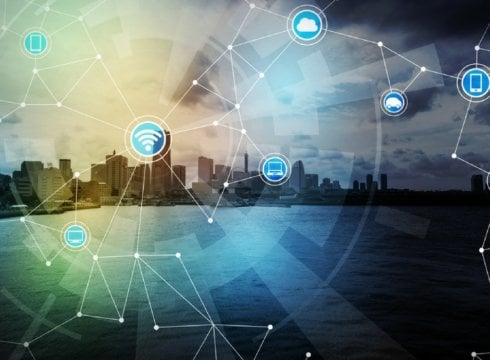Inc42 Daily Brief
Stay Ahead With Daily News & Analysis on India’s Tech & Startup Economy
Can you imagine a situation where your fridge senses a shortage of power and switches off, so that the electricity could be redirected to your power-hungry washing machine that you plan to use? Or when the AC decides to go into snooze mode the moment you plan to use the mixer? Well, we cannot.
But this is exactly where technology is headed. The Internet of things (IoT) can help your energy-intensive appliances to operate more efficiently and iron out spikes in demand. Optimisation is key to any plans of the country moving away from conventional sources of energy to alternative ones.
While, traditionally, electricity has been produced at big facilities and then circulated, the idea now is to ensure that businesses and homes start generating power by themselves using green sources of energy such as solar panels or wind mills.
But that green energy will be meaningful only if used efficiently, since stable supply is an issue with such sources of energy. This is where IoT comes into the picture. It will help you harness clean power with optimisation.
Acute Power Shortage, Alternative Sources Of Energy
India faces exploding demand and insufficient supply. Millions of people in India have no access to electricity, with more than 40% households going powerless, which translates to 400 million people. For the economy to grow, consistent power supply is a bare minimum. New sources of energy will have to be explored.
Currently, India’s depends heavily on fossil fuels with 67% of power generation coming from thermal resources. Coal is the mainstay but its production is insufficient to guarantee a stable supply. India also happens to the world’s fourth biggest importer of crude oil. Domestic production of natural gas has in fact decreased in recent years. Moreover, with India’s reserves of fossils fuels depleting fast, the country will have to look for alternative sources of energy. Particularly, in the context of recent initiatives such as Digital India and Smart City, consistent power supply is a basic requirement.
“An important attribute of smart cities has to be self-sufficiency. Energy efficiency and clean power production such as roof top solar panels etc. should be an integral part of the city. High dependency on fossil fuels seriously threatens air quality of cities. So, it is important to move away from fossil fuels and adopt renewable energy,” said Nandikesh Sivalingam, senior campaigner, Greenpeace.
Harnessing Clean Power With IoT
You could create clean power out of solar energy, wind, or even a small brook or stream flowing by your house. However, the main problem with such generation is that supply is not stable. Therefore, optimisation of available power is a must.
To do that smart appliances are embedded with sensors and are interconnected. Data is collected through the sensors and transmitted to the grid.
Generally, the data includes numerous variables, ranging from the electricity load at any particular time to the blade resistance of the wind energy turbine or the temperatures in the solar panels; every component is sensed and monitored. The generated data is then collected and uploaded to the cloud for processing.
Since there is a humungous amount of data to be analysed and the window for action is limited, big data tools are used to process it. The entire process is too complex and the decision-making is too quick to be carried out manually or even through a computer.
“That time may not be far in the future, when IoT sensors could run a dishwasher on the basis of how windy or sunny it is outside, or even switch off a few appliances such as air conditioners for some time particularly when the other devices are utilising greater amounts of power,” said Shashank Dixit, CEO, Deskera, a leading cloud-based software provider in the Asia-Pacific region.
Utilised properly, IoT along with smart metering, cloud computing, and wireless connected sensors could help you not only to produce and use your own electricity, but also to export power to the central grid, helping you earn money as well.
[The author Muqbil Ahmar is a technology evangelist and storyteller at heart. He is also an avid blogger and writes on Cloud, Big Data, IoT, startups, SMEs, Enterprises, Technology, ERP, and CRM.]
Note: We at Inc42 take our ethics very seriously. More information about it can be found here.


